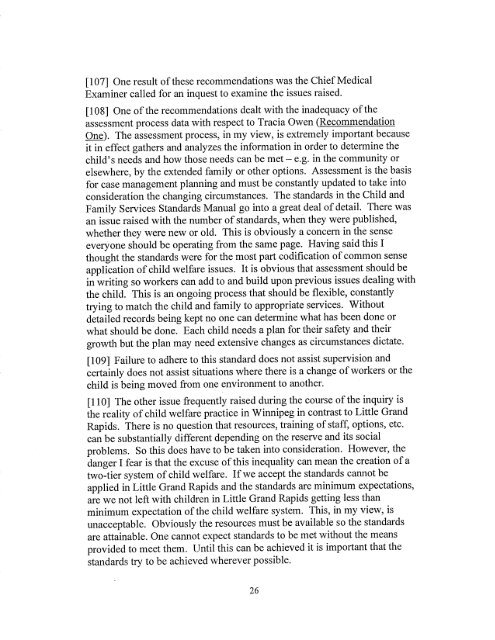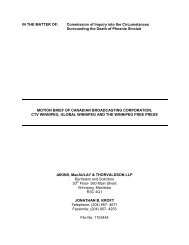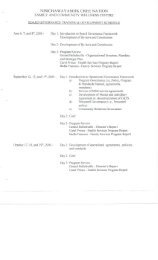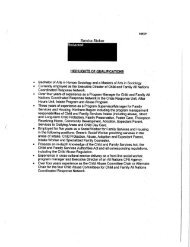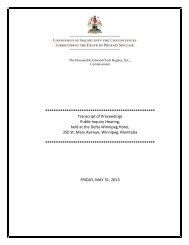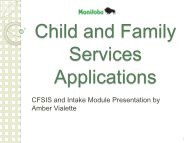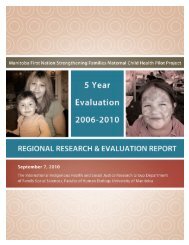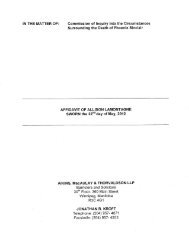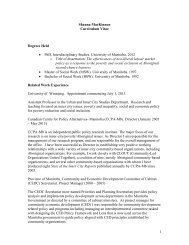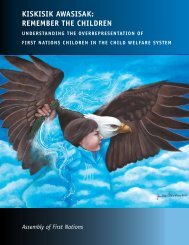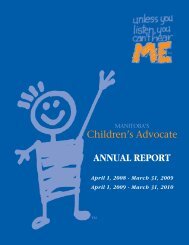Affidavit of Michael Bear - Phoenix Sinclair Inquiry
Affidavit of Michael Bear - Phoenix Sinclair Inquiry
Affidavit of Michael Bear - Phoenix Sinclair Inquiry
You also want an ePaper? Increase the reach of your titles
YUMPU automatically turns print PDFs into web optimized ePapers that Google loves.
[107] One result <strong>of</strong> these recommendations was the Chief Medical<br />
Examiner called for an inquest to examine the issues raised.<br />
[108] One <strong>of</strong> the recommendations dealt with the inadequacy <strong>of</strong> the<br />
assessment process data with respect to Tracia Owen (Recommendation<br />
One). The assessment process, in my view, is extremely important because<br />
it in effect gathers and analyzes the information in order to determine the<br />
child's needs and how those needs can be met — e.g. in the community or<br />
elsewhere, by the extended family or other options. Assessment is the basis<br />
for case management planning and must be constantly updated to take into<br />
consideration the changing circumstances. The standards in the Child and<br />
Family Services Standards Manual go into a great deal <strong>of</strong> detail. There was<br />
an issue raised with the number <strong>of</strong> standards, when they were published,<br />
whether they were new or old. This is obviously a concern in the sense<br />
everyone should be operating from the same page. Having said this I<br />
thought the standards were for the most part codification <strong>of</strong> common sense<br />
application <strong>of</strong> child welfare issues. It is obvious that assessment should be<br />
in writing so workers can add to and build upon previous issues dealing with<br />
the child. This is an ongoing process that should be flexible, constantly<br />
trying to match the child and family to appropriate services. Without<br />
detailed records being kept no one can determine what has been done or<br />
what should be done. Each child needs a plan for their safety and their<br />
growth but the plan may need extensive changes as circumstances dictate.<br />
[109] Failure to adhere to this standard does not assist supervision and<br />
certainly does not assist situations where there is a change <strong>of</strong> workers or the<br />
child is being moved from one environment to another.<br />
[110] The other issue frequently raised during the course <strong>of</strong> the inquiry is<br />
the reality <strong>of</strong> child welfare practice in Winnipeg in contrast to Little Grand<br />
Rapids. There is no question that resources, training <strong>of</strong> staff, options, etc.<br />
can be substantially different depending on the reserve and its social<br />
problems. So this does have to be taken into consideration. However, the<br />
danger I fear is that the excuse <strong>of</strong> this inequality can mean the creation <strong>of</strong> a<br />
two-tier system <strong>of</strong> child welfare. If we accept the standards cannot be<br />
applied in Little Grand Rapids and the standards are minimum expectations,<br />
are we not left with children in Little Grand Rapids getting less than<br />
minimum expectation <strong>of</strong> the child welfare system. This, in my view, is<br />
unacceptable. Obviously the resources must be available so the standards<br />
are attainable. One cannot expect standards to be met without the means<br />
provided to meet them. Until this can be achieved it is important that the<br />
standards try to be achieved wherever possible.<br />
26


